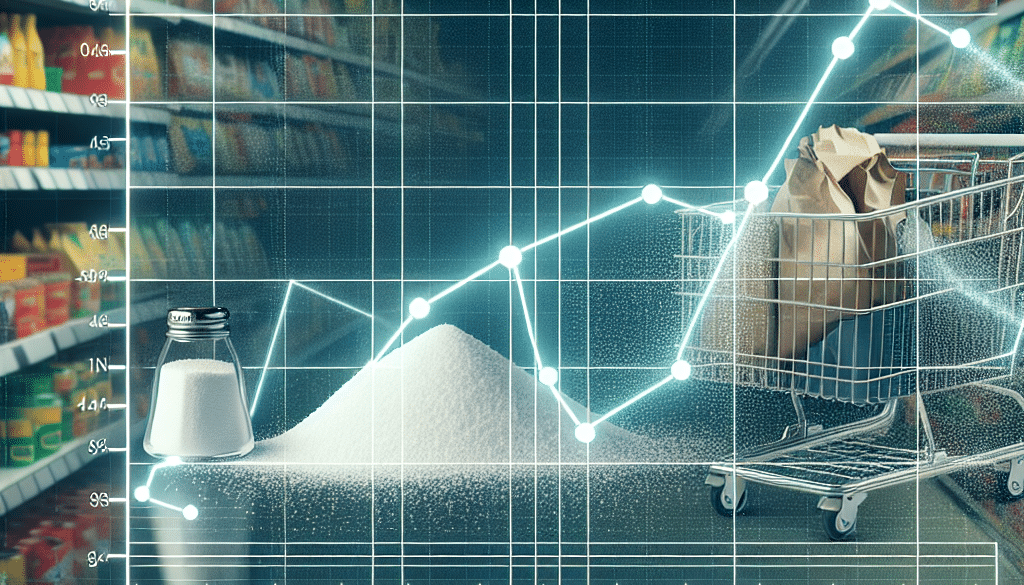Have Consumers Changed How Much Sodium They Purchase?
-
Table of Contents
- Sodium Consumption Trends: Are Shoppers Buying Less Salt?
- The Health Risks of Excessive Sodium Intake
- Consumer Awareness and Education
- Statistical Evidence of Changing Sodium Purchases
- Case Studies: Success Stories of Reduced Sodium Products
- Challenges and Considerations
- Conclusion: A Shift Towards Healthier Choices
- ETprotein: A Healthy Alternative for Sodium-Conscious Consumers
Sodium Consumption Trends: Are Shoppers Buying Less Salt?
In recent years, there has been a growing awareness of the health implications associated with high sodium intake. This awareness has prompted consumers to reconsider their dietary choices, including how much sodium they purchase. This article delves into the changing patterns of sodium consumption, exploring whether consumers have indeed altered their purchasing habits in favor of lower sodium options.
The Health Risks of Excessive Sodium Intake
Before examining the purchasing trends, it’s crucial to understand why sodium is a concern. Sodium, a key component of salt, is essential for bodily functions, but excessive intake can lead to hypertension, heart disease, stroke, and kidney damage. The American Heart Association recommends no more than 2,300 milligrams a day, moving toward an ideal limit of 1,500 mg per day for most adults.
Consumer Awareness and Education
Increased public health campaigns and labeling initiatives have heightened consumer awareness about the risks of high sodium intake. Nutrition labels now prominently display sodium content, and ‘low-sodium’ or ‘no added salt’ products are more visible on shelves. This educational push seems to be resonating with shoppers, as evidenced by their changing buying habits.
Statistical Evidence of Changing Sodium Purchases
Several studies and market research reports have indicated a shift in consumer behavior. For instance:
- A report by the Centers for Disease Control and Prevention (CDC) showed a slight decrease in the average sodium intake among adults.
- Market research from Euromonitor International suggests a growing market for reduced-sodium packaged foods.
- Consumer surveys have found that a significant percentage of shoppers are actively trying to reduce their sodium intake.
These findings suggest that consumers are not only aware of the health risks associated with sodium but are also taking steps to mitigate them through their purchasing decisions.
Case Studies: Success Stories of Reduced Sodium Products
Several brands have successfully reformulated their products to offer lower sodium options, and these case studies highlight the positive reception from consumers:
- A well-known soup manufacturer reported increased sales after introducing a line of low-sodium soups.
- A major snack company found that their reduced-sodium versions of popular chips were well-received by health-conscious consumers.
- Fast-food chains that have introduced lower-sodium menu options have seen a favorable response from customers looking for healthier alternatives.
These examples demonstrate that there is a market for reduced-sodium products and that consumers are willing to purchase them.
Challenges and Considerations
Despite the positive trends, there are challenges to reducing sodium in the diet:
- Many consumers are unaware of how much sodium is in their food, especially when it comes to processed and restaurant foods.
- Taste preferences for saltiness can make it difficult for some individuals to switch to lower-sodium options.
- There is a need for more education on reading nutrition labels and understanding the sodium content in foods.
Addressing these challenges is crucial for continuing the momentum towards reduced sodium consumption.
Conclusion: A Shift Towards Healthier Choices
In conclusion, there is compelling evidence that consumers are changing how much sodium they purchase. The combination of increased awareness, education, and the availability of lower-sodium products has contributed to this shift. While there are still challenges to overcome, the trend towards healthier, lower-sodium diets is a positive sign for public health.
ETprotein: A Healthy Alternative for Sodium-Conscious Consumers
For those looking to reduce their sodium intake without compromising on protein, ETprotein offers a range of organic bulk vegan proteins that are low in sodium and free from additives. Their products, such as Organic rice protein and pea protein, provide a nutritious alternative for consumers who are mindful of their sodium consumption.
ETprotein’s commitment to quality and purity ensures that their proteins are not only beneficial for health but also cater to the needs of sodium-conscious consumers. By incorporating ETprotein’s products into their diets, individuals can enjoy the benefits of protein without the added sodium that often comes with animal-based proteins.
About ETprotein:
ETprotein, a reputable protein and L-(+)-Ergothioneine (EGT) Chinese factory manufacturer and supplier, is renowned for producing, stocking, exporting, and delivering the highest quality organic bulk vegan proteins and L-(+)-Ergothioneine. They include Organic rice protein, clear rice protein, pea protein, clear pea protein, watermelon seed protein, pumpkin seed protein, sunflower seed protein, mung bean protein, peanut protein, and L-(+)-Ergothioneine EGT Pharmaceutical grade, L-(+)-Ergothioneine EGT food grade, L-(+)-Ergothioneine EGT cosmetic grade, L-(+)-Ergothioneine EGT reference grade and L-(+)-Ergothioneine EGT standard. Their offerings, characterized by a neutral taste, non-GMO, allergen-free attributes, with L-(+)-Ergothioneine purity over 98%, 99%, cater to a diverse range of industries. They serve nutraceutical, pharmaceutical, cosmeceutical, veterinary, as well as food and beverage finished product distributors, traders, and manufacturers across Europe, USA, Canada, Australia, Thailand, Japan, Korea, Brazil, and Chile, among others.
ETprotein specialization includes exporting and delivering tailor-made protein powder and finished nutritional supplements. Their extensive product range covers sectors like Food and Beverage, Sports Nutrition, Weight Management, Dietary Supplements, Health and Wellness Products, and Infant Formula, ensuring comprehensive solutions to meet all your protein needs.
As a trusted company by leading global food and beverage brands and Fortune 500 companies, ETprotein reinforces China’s reputation in the global arena. For more information or to sample their products, please contact them and email sales(at)ETprotein.com today.














